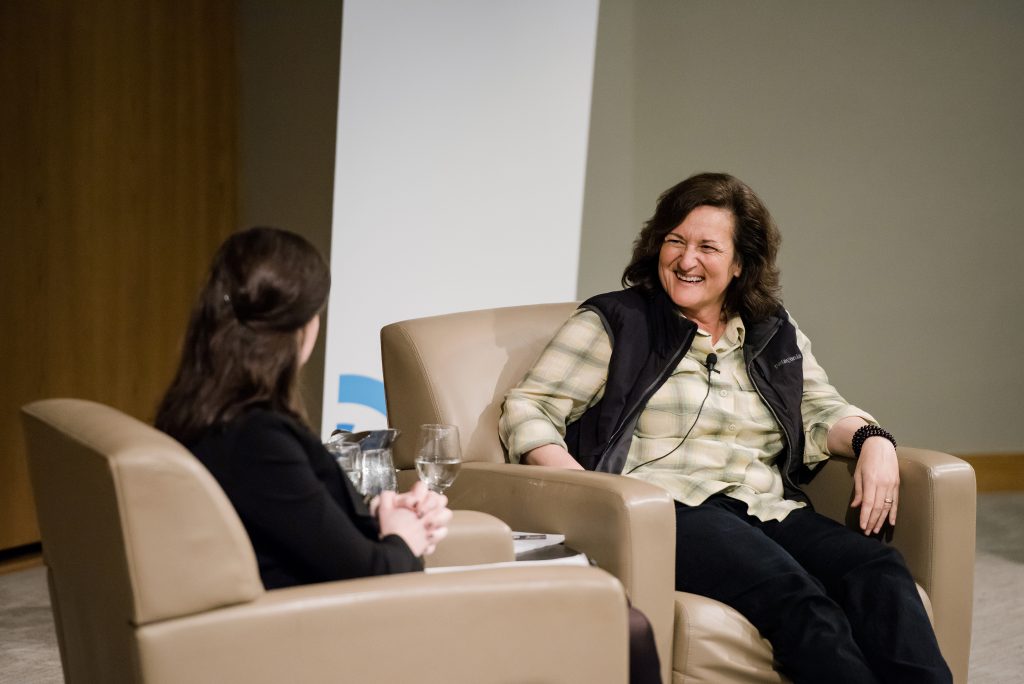This post was written by Emily Silman, a second-year Duke MBA student, CASE Fellow and a member of the Fuqua chapter of the Net Impact Club, in April 2016.
You know a CEO isn’t a stereotypical stuffy, out-of-touch C-suite leader when they request to deliver their conference keynote not just as an informal “fireside chat”-style conversation but with an MBA student as their interviewer. This is just one of the many ways in which Patagonia CEO Rose Marcario embodies a truly different style of leadership. Relaxed and down-to-earth, yet frank about the issues and causes that she stands for, Marcario provided a magnificent capstone to this year’s Sustainable Business and Social Impact conference at Fuqua.
As the student who was lucky enough to be chosen to interview her on stage, I was both awed and impressed by Marcario’s achievements and position, but also very much put at ease by her warm and humorous demeanor. After the keynote people kept asking me, “Were you nervous?”, and I could only answer that I wasn’t, simply because she was so wonderful to talk to. I don’t know who will be the next CEO I’ll meet, but the bar has been set pretty high.
Over the course of the conversation, three key themes emerged:
Corporate Leadership
As one of the most recognizable brands both in the outdoor industry and in the sustainable business world, Patagonia is a company that means a great deal to a lot of people. Marcario recognizes the company’s significance and what that puts them in a position to do.A great proponent of B Corps, she discussed how Patagonia has been able to take a leadership position after blazing the trail by becoming a B Corp and now can act as a model to support other companies wishing to follow their lead.Another leadership area they’re focusing on is the apparel industry, by spearheading the formation of the Sustainable Apparel Coalition. Marcario described the significant challenges in getting this diverse group of peer companies to band together towards the common cause of apparel sustainability but also talked about how Patagonia has been able to use their strong brand equity and experience in this space to act as a uniting and inspirational force.
The Power of Partnerships
The importance of working together is another factor that Marcario cited as being crucial not just for Patagonia and apparel companies but for the business landscape as a whole. As with the aforementioned Sustainable Apparel Coalition, she talked at length about the need for companies to work together towards a common goal, an ideal that meshes beautifully with our collaborative emphasis at Fuqua.Of course, being a private company puts Patagonia in a slightly different position than public companies but she was unequivocal in her advocacy for the importance of creating a network of like-minded firms. One example we discussed was Patagonia’s newly-developed plant-based rubber for wetsuits, Yulex, which is significantly more environmentally sound than petroleum-derived traditional neoprene.But rather than keep this technology proprietary, Patagonia has chosen to make it available to competitors.When I asked her why they decided to do this, Marcario was straightforward: the world will be a better place if more companies use this material instead of neoprene, so it fits Patagonia’s corporate goals to spread it far and wide.
Innovating for Good
Yulex is just one example of the many innovations that Patagonia has made in the name of product durability and environmental responsibility. One striking way that Patagonia stands apart from other companies is that they engineer their products for a long life span (versus the “planned obsolescence” of fast fashion and technology gadgets).However, this emphasis on durability and responsible materials means that Patagonia’s products are usually priced beyond reach for many consumers. This topic came up in our conversation and as a question from an audience member—do environmentally-friendly products only have to be for wealthy consumers?Marcario was frank in her response: “The best thing you can do as a consumer is to buy less stuff and good quality stuff that lasts.” If more consumers demand responsibly-made products from all companies then the cost of making those products would go down overall, making them affordable to more people. Patagonia is trying to expand their reach in responsible materials purchasing by branching into denim—what they call a “filthy business”—and when I asked Marcario which product she is most proud of, she pointed to the jeans she was wearing.
In wrapping up the keynote, Marcario urged all of us impact-minded MBA students to stay true to ourselves and that even if our immediate post-MBA employment offers don’t involve working for a B Corp or a social enterprise we can still have a career with an impact. After doing some soul searching and personal reflection, Marcario herself transitioned from a career in private equity to running a company that manages to be hugely successful while refusing to back down on their commitment to the environment.
As I prepare to graduate and re-enter the corporate world, it was an important message for me to hear. And the interview experience as a whole could not have been a more valuable and rewarding opportunity to cap off my two incredible years at Fuqua. CASE and the Net Impact club have been integral parts of my experience here, as well as key drivers for my decision to attend Fuqua, and it was an honor to represent them on stage while talking with a CEO whose insight and wisdom I am certain will leave a lasting impression on me.Hear from Rose Marcario herself in these excerpts from her keynote:


